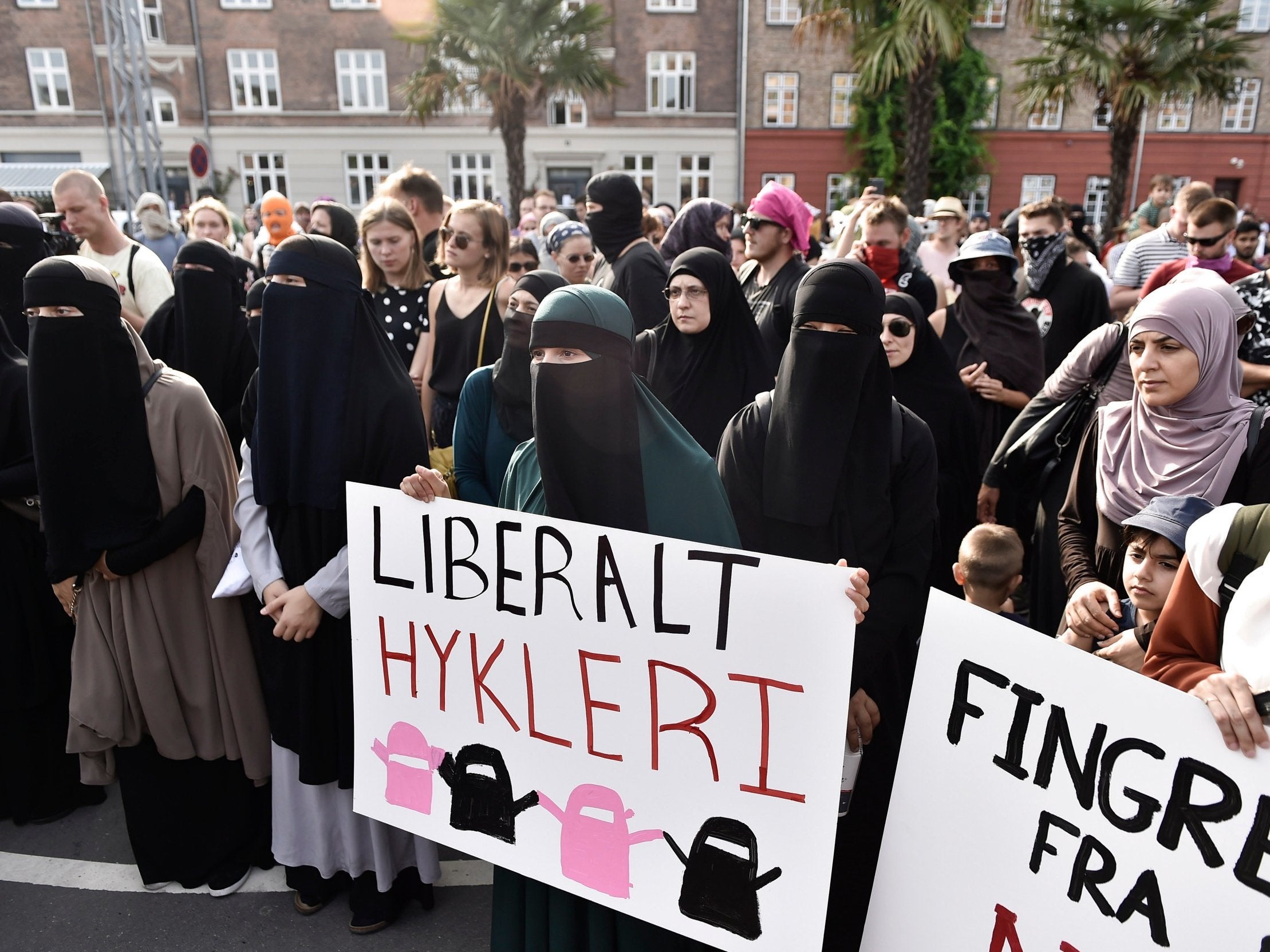Burqa ban: Women protest new law in Denmark banning full-face veil
People who do not follow new rule can be fined over £100 for a first offence, with figure rising to £1,200 or a jail sentence of up to six months

Your support helps us to tell the story
From reproductive rights to climate change to Big Tech, The Independent is on the ground when the story is developing. Whether it's investigating the financials of Elon Musk's pro-Trump PAC or producing our latest documentary, 'The A Word', which shines a light on the American women fighting for reproductive rights, we know how important it is to parse out the facts from the messaging.
At such a critical moment in US history, we need reporters on the ground. Your donation allows us to keep sending journalists to speak to both sides of the story.
The Independent is trusted by Americans across the entire political spectrum. And unlike many other quality news outlets, we choose not to lock Americans out of our reporting and analysis with paywalls. We believe quality journalism should be available to everyone, paid for by those who can afford it.
Your support makes all the difference.Women in Denmark are wearing burqas and niqabs in protest at a new law banning the garments that comes into force today.
Denmark is the latest European country to ban items of clothing that cover the face – including Islamic veils such as the niqab or burqa – after parliament approved the ban in May.
People who do not follow the new rule can be fined over £100 for a first offence – with the figure rising to £1,200 or a jail sentence of up to six months.
Supporters and opponents of the ban battled it out as the law came into effect on Wednesday.
Marcus Knuth, a Danish MP for the ruling liberal party Venstre, argued the dress worn by some conservative Muslim women was “strongly oppressive”.
Sasha Andersen, of the Party Rebels activist group, is planning a protest later in the day against what it branded a “discriminatory” measure against a minority group.
Protests against the ban are scheduled for later on Wednesday in the Scandinavian country’s capital Copenhagen and the city of Aarhus.
Police have said protesters who planned to fully cover their faces at the demonstrations would not be at risk of being issued with a fine.
However, Benny Ochkenholt of the Danish national police told public broadcaster DR that fines could be dished out if attendees wore face veils en route to and from the protests.
Groups which are in favour of what is known as the “burqa ban” also plan to gather.
A spokesperson for Kvinder I Dialog (Women In Dialogue), a group which is opposed to the ban, told The Independent a “huge demonstration” is taking place and they would not be “bending the knee to injustice”.
“The purpose of this demonstration is to show that we do not accept this kind of unjust treatment regardless of who we are dealing with,” she said.
“They [the police] have emphasised that they will not tear off women’s niqabs if they spot them in the streets. Getting fined is more probable.”
She argued the ban was an attempt to restrict the Muslim community and their religious identity and values.
“When the initiators and supporters of this ban are asked about women’s rights over their own body, they answer that of course women should be guaranteed absolute right to decide what is best for themselves and their bodies,” she said.
“It is, therefore, a matter of contradiction and hypocrisy when the very same people violate our right to cover our faces. We are saddened by the unjust and racist choice the Danish government has made.
“As opposed to what they claim is the purpose of the ban, we are now being criminalised, marginalised, excluded from society and otherised for the sole reason of dressing differently from the mainstream.”
Amnesty International said the law is “neither necessary nor proportionate”.
Fotis Filippou, Amnesty International’s deputy Europe director, told The Independent: “All women should be free to dress as they please and to wear clothing that expresses their identity or beliefs. This ban will have a particularly negative impact on Muslim women who choose to wear the niqab or burqa.
“Whilst some specific restrictions on the wearing of full-face veils for the purposes of public safety may be legitimate, this blanket ban is neither necessary nor proportionate and violates women’s rights to freedom of expression and religion.
“If the intention of this law was to protect women’s rights it fails abjectly. Instead, the law criminalises women for their choice of clothing – making a mockery of the freedoms Denmark purports to uphold.”
The face-covering ban – which is predominantly seen as being directed at the niqab and burqa – is subject to a number of exemptions including bicycle and motorbike helmets and clothing which offers insulation from cold weather. It permits people to cover their face when there is a “recognisable purpose”.
The law does not include turbans, headscarves or Jewish skull caps.
Few Muslim women in Denmark wear full-face veils – with a 2010 report estimating that up to 200 women in the country of 5.7 million wore them.
The ban was presented by the centre-right governing coalition which has become known for ramping up asylum and immigration rules in recent years.
In 2016, Denmark brought in a law forcing newly arrived asylum seekers to hand over valuables such as jewellery and gold to help fund their time residing in the country.
Anyone forcing a person to wear items of clothing which cover the face by using force or threats can be fined or face up to two years in prison.
Denmark joins several other European countries that have introduced similar measures, including Belgium, France and Germany.
Join our commenting forum
Join thought-provoking conversations, follow other Independent readers and see their replies
Comments